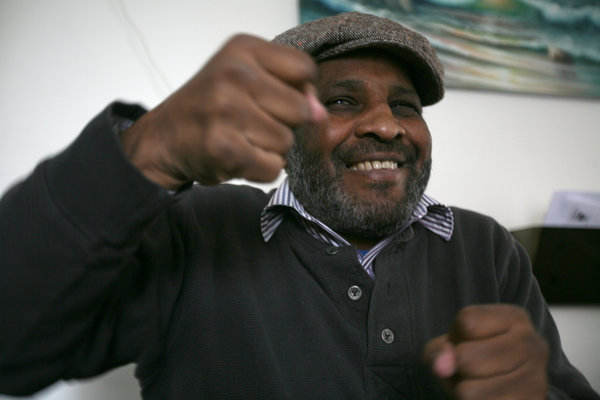Librado Romero/The New York Times
Widely anthologized and with numerous titles that remain in demand among students and fans, Mr. Laviera was one of the best-known representatives of the Nuyorican school of poetry.
By DAVID GONZALEZ
Published: November 5, 2013
Tato Laviera lost his sight, but not his vision. His acclaimed poems and plays captured the rhythms and language of Puerto Rico and the Lower East Side — his twin loves — with equal measures of protest, playfulness and hope.
Connect With Us on Twitter
Follow @nytimesarts for arts and entertainment news.
Arts Twitter List: Critics, Reporters and Editors
A sortable calendar of noteworthy cultural events in the New York region, selected by Times critics.
Go to Event Listings »
When health problems briefly left him homeless in 2010, he took part in poetry readings with residents of the shelter where he stayed. “I can create here, and that makes me feel liberated,” he said in an interview at the time. “Being here has given me the spirit of continuity and centrality, and that’s better than a salary.”
Mr. Laviera, who had been in a coma since late January, died on Friday in Mount Sinai Hospital in Manhattan. The cause was complications of diabetes, which years earlier had left him legally blind, said his sister, Ruth Sanchez, who survives him along with his daughter, Ruth Ella Laviera. He was 63 and lived in East Harlem, renting an airy apartment that his admirers helped him get when they learned he had no place to hang his ever-present Panama hat. In a career that spanned more than four decades, Mr. Laviera published books, plays and poems and made hundreds of appearances at colleges, workshops and literary events. Widely anthologized and with numerous titles that remain in demand among students and fans, he is one of the best-known representatives of the Nuyorican school of poetry.
His words could dance, shout and laugh — in English, Spanish and Spanglish. In “My Graduation Speech,” he showed a playful touch in writing about his multicultural life, and his hair, in these lines:
i think in spanish
i write in english
i want to go back to puerto rico,
but i wonder if my kink could live
in ponce, maygüez and carolina
“The American thing is to forget who you are and become homogenized,” said Jesus Melendez, known as Papoleto, a friend and fellow poet. “The whole Nuyorican struggle was to maintain your roots because they are the groove that keeps it all together. Tato personified that struggle.”
He even took the word and turned it inside out in one collection, “AmerRican,” whose very title made clear his people’s place in the world. That book also featured poems that embraced the city’s diversity as well as his own people’s rich racial roots.
“Tato’s voice was not a singular one, but one that gave voice to people and even objects who did not have a voice but should,” said William Luis, a professor at Vanderbilt University and co-editor of an upcoming collection of essays on Mr. Laviera. “He was able to reach across boundaries and reach all those different people.”
Jesús Abraham Laviera (Tato was a nickname) was born on May 9, 1950, in Santurce, P.R., near San Juan, and moved to the Lower East Side as a child. He graduated from Seward Park High School and attended Brooklyn College and Cornell. But his real education, friends and relatives said, came in the neighborhood, where he showed an early knack for activism and organizing (not to mention music and dance).
Elizabeth Colón, a community advocate who befriended him when they were both teenagers, described Mr. Laviera as a natural leader who inspired others to rally around causes, especially youth and education.
“His poetry and creativity came from that,” she said. “It came from his involvement and his participation in the community’s struggle, growing up on the Lower East Side, seeing the abuses and how others who were in charge had the power to intervene and did not. He deeply understood the need of people to participate in their future.”
Mr. Laviera left community organizing to become a full-time poet in the 1970s. (He told the website Latino Rebels that he wanted to be a poet once he saw Luis Palés Matos recite in Puerto Rico in the late 1950s.) His first collection, “La Carreta Made a U-Turn,” was published by Arte Publico Press in 1979.
“To him, poetry was the highest calling,” said Nicolás Kanellos, his publisher. “Even though he lived in relative poverty, he was proud of being part of a tradition that went all the way back to the ancient, epic poets.”
But Mr. Laviera lived — and performed — very much in the moment. In recent years he had been working on a novel about East Harlem, as well as staging his play “The King of Cans” at a theater inside the housing complex where he had been living. He also continued to inspire future poets, sharing encouragement and advice.
Li Yun Alvarado recalled clutching a poem at a workshop Mr. Laviera gave at Yale 14 years ago. She was nervous. He calmed her down, telling her to “embody the work” and feel the words, linger on the beats and perform. It reminded her of how her 93-year-old grandmother could still remember a poem she had learned as a child.
“He took me back to that history of poetry as part of our culture,” said Ms. Alvarado, who is a now doctoral candidate at Fordham University. “He was our troubadour. He told our story.”
